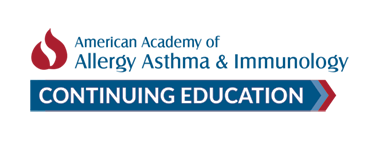Learning Why We Need to Know about Cost Effectiveness Analysis (LYCEA)
Allergy specialists help patients manage many treatable disorders. Each treatment, from avoidance measures to therapeutics, comes at a cost. At a time when the price of pharmaceuticals is rising and healthcare is shifting to a value-based model, physicians may look to educate themselves on effective treatment options that reduce costs to the patient and society. To this end, this course will provide foundational information about cost effectiveness analysis and how it may be used to help allergists present options for cost effective care to patients.
This online course is the product of a AAAAI Leadership Institute project.
Target Audience
- Allergist/immunologists
- Fellows-in-Training
- Nurses and Nurse Practitioners
- Physician Assistants and Other Allied Health Professionals
Learning Objectives
Upon completion of this course, the learner will be able to:
1. Identify the potential uses of cost-effectiveness analysis (CEAs)
2. Answer questions about the components of CEAs and their development
3. Demonstrate familiarity with current research on CEAs in the allergy specialty
Content Authors
Christopher D. Codispoti, MD PhD FAAAAI
Rush University Medical Center
Relevant relationships: None
Leadership Institute Mentors and Content Reviewers
James E. Gern, MD FAAAAI
University of Wisconsin, Madison, WI
Relevant Relationships: None
Matthew Rank, MD FAAAAI
Mayo Clinic and Foundation, Scottsdale, AZ
Relevant Relationships: None
Content Reviewers
Bruce J. Lanser, MD MPH FAAAAI
National Jewish Health
Relevant relationships: None
AAAAI Disclosure Policy
Pursuant to the Code of Ethics for the American Academy of Allergy, Asthma & Immunology (AAAAI) and the Standards for Commercial Support of Continuing Medical Education of the Accreditation Council for Continuing Medical Education, the AAAAI requires disclosure of certain information from faculty members of educational activities designated for CME credit by the AAAAI. Prior to the activity, authors and reviewers are required to disclose all relationships that meet the following parameters:
- Employment: Name of employer and job title.
- Financial interests: All organizations, other than the employer, from which the faculty member or a member of his/her immediate family or household receives annual remuneration in any amount (including grants, honoraria and consulting fees).
- Research interests: All organizations which support research projects for which the faculty member or member of his/her immediate family or household serves as an investigator.
- Legal Consultation Services/Expert Witness Testimony: All topics on which the faculty member provided legal consultation and/or expert witness testimony during the previous calendar year.
- Organizational interests: All organizations, other than the AAAAI, for which the faculty member holds volunteer positions.
- Gifts: All organizations from which the faculty member or a member of his/her immediate family or household have received a gift of any amount in the last year.
- Other interests: All interests of the faculty member or a member of his/her immediate family or household that would be judged by a majority of his/her peers to be more than casual and/or likely to impact his/her ability to exercise independent judgment. This includes any financial interest in or relationship with any manufacturer of a commercial product, and any financial interest or relationship with any organization that provides commercial support to AAAAI-sponsored educational activities.
The information disclosed by the speakers and planning committee was reviewed in accordance with the AAAAI Disclosure Policy. All potential conflicts of interest were resolved by the planners, faculty, and reviewers prior to their participation in the development of this activity.
Accreditation Statement
The American Academy of Allergy, Asthma and Immunology (AAAAI) is accredited by the Accreditation Council for Continuing Medical Education to provide continuing medical education for physicians.
Designation Statement
The American Academy of Allergy, Asthma & Immunology designates this enduring material for a maximum of 0.50 AMA PRA Category 1 Credit(s)™.
Credit Claiming Period
Credit claiming for this activity will expire at 11:59 pm on December 31, 2024. Requests to claim credit after January 1, 2025 will be denied.
Medium and Method of Physician Participation
Follow these steps to complete the activity:
- Register for the activity.
- Review the information in the Faculty and Accreditation tabs.
- Click Begin (from the Overview, Register, or Begin tabs).
- Complete the online module, including the assessment. You must achieve a score of 70% or higher to claim credit.
- Complete the activity evaluation.
- Claim your credits.
- Print or save your certificate.
AAAAI Privacy Policy
To verify your participation in educational activities, you may be asked to provide your name, contact information, and/or other descriptors. The AAAAI will not release this information to outside entities. It may be used internally to inform you of other AAAAI educational activities. If you wish to have your information excluded from this process, please contact us at [email protected].
Questions
Activity-related questions should be directed to [email protected].
Available Credit
- 0.50 AttendanceAttendance credit.
- 0.50 CMECME credit.

 Facebook
Facebook X
X LinkedIn
LinkedIn Forward
Forward